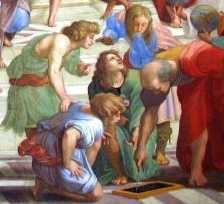Lucis largítor spléndide,
Generous giver of glimmering light
cuius seréno lúmine
whose serene lamp
post lapsa noctis témpora
after the night time has slipped away
dies refúsus pánditur,
the returning day is spread out
WONDROUS giver of the light!
By whose eternal ray serene,
After the lingering hours of night,
The glory of the morn is seen,
2. Tu verus mundi lúcifer,
Thou true morning star of the world
non is qui parvi síderis
not like the lesser star (the sun)
ventúræ lucis núntius
though herald of the coming Light
angústo fulget lúmine,
scanty shines its narrow light
Bringer of light indeed art thou;
Not like the common sun of day
That o'er the world is rising now
And shining with a narrow ray;
3. Sed toto sole clárior,
But clearer than the entire sun
lux ipse totus et dies,
that entire light itself and the day
intérna nostri péctoris
our inward soul
illúminans præcórdia.
brightening hearts
Nay, brighter than the solar beam,
Thyself the sun and perfect light,
And in the breast thy tender gleam
Illumes with glory pure and bright.
4. Evíncat mentis cástitas
Let chastity of the mind overcome
quæ caro cupit árrogans,
those things the flesh desires amiss
sanctúmque puri córporis
holy and of chaste body
delúbrum servet spíritus.
shrine(temple) the spirit keep
Let not our minds be overcome
By false desire or deed of shame,
And be our hearts a shrine and home
Wherein shall burn thy holy flame.
5. Sit, Christe, rex piísime,
tibi Patrique glória
cum Spíritu Paráclito,
in sempitérna saécula. Amen.
I found the metrical translation of this hymn this morning on Google books. Apparently this hymn was composed by St. Hilary of Potiers in the fourth century. According to Butler's Lives of the Saints (found here at EWTN ) Hilary included this morning hymn and an evening hymn(now lost) in a missive to a daughter, Apra (he was married before his conversion). The letter to Apra implores her to choose a life of virginity over married life.
The translation, published by Daniel Joseph Donohoe in 1908, contains two other verses between the present vss 3 and 4, and a different verse in place of the doxology.
Another translation is given here at CCEL.
Daily Rome Shot 1557
-
Today’s Wordle 5 There is some trouble with the blog’s software right now.
We will be doing some maintenance later in the week. I can’t easily get to
the...
7 hours ago

No comments:
Post a Comment